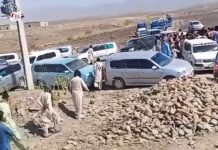Author: Hakeem Baloch
It is a common practice for every political and HR activist or a leader to meet the people from different groups and engaging with intellectuals. If you’re in diaspora and your political approach is to get the attention of the political parties of the country you are based, then you must get out, find some ways and knock their doors.
Once you are successful in knocking those doors, the next step is more complicated and complex. Now you have an idea who is behind that door and it is the right time to set an appropriate strategy and without wasting your time and energy you must enter the room with full confidence.
In recent past meetings with officials of different political parties of the UK, and with some intellectuals, had allowed us to understand the way of putting your question in such a manner that it should not be ignored and it is heard by someone, and they are obliged to speak or act upon it.
There are some basic things which people actually lack when meeting with people from different backgrounds, culture, language and countries. And they simply use the same terminology, which they normally use in protests or in seminars or any other gathering. Most of the time these terms are being used with so much emotion and stress. People on the other end of the table then only think about the matters, whichever, he was told and presented by the person who met them.
No one can deny this fact, even for a second, that worst form violations of Human Rights are taking place in Balochistan, but similarly even in Punjab which is known as the real and only Pakistan is also witnessing the HR violations, abductions and arrests of journalists, rape cases, attacks on religious minorities and arresting the leaders of the opposition parties are some examples of HR violations in Punjab.
This article is not about comparing the ratio of violations in Balochistan and Punjab, but it is all about understanding, about that thin line on which activists and leaders are walking. This article will try to draw the attention of all of those and ensure that when they walk through it they are not slipping in.
Undoubtedly, human rights violations is simply not a good practice to be carried out against any community, groups and nations. Understanding the HR and violations of HR is important to understand the basics of it.
Article. 1 of the Universal Declaration of Human Rights (UDHR) says that “All human beings are born free and equal in dignity and rights. They are endowed with reason and conscience and should act towards one another in a spirit of brotherhood.”
UDHR was a declaration that was signed by the United Nations. UDHR was an idea which came to life after the Second World War and it has been in power since December 1948.
UDHR has about 30 articles, speaking about the Human rights of individuals, groups, nations. Unfortunately, even after 70 years of that resolution has been passed in the UN there are still human rights violations taking place in almost every part of the world. And the worst cases are from Africa and Asia.
Focusing on the term Violations of Human Rights:
One must understand and know the types of violations of human rights the people of Balochistan are facing:
- Abductions
- Torture
- Extrajudicial murders
- Target killings
- Fake charges
- Suppressing the critical voices
- Forcing people to support the narrative of state
- Forcing people to stay away from the mainstream political parties by banning them or labelling them as terrorists or foreign agents
- Not giving access to the locals of Gwadar into those zones, which are classified as the developed and established zone
- Forceful evacuations of the people of those areas who were living in the vicinity of CPEC route
Above given list and the issues are serious and most concerning violations of human rights taking place in Balochistan, but it is not an exhaustive list.
To tell the world about these violations you have to be well aware of the incidents by yourself, you must be able to answer the questions and your answer should be supported with evidence. Your evidence in most cases is in the bundles of the reports which you are carrying with you. For example, speaking about the case of Mohammad Hayat Mirza Baloch, who was killed in front of many eye-witnesses and his parents. You can find a huge amount of evidence in such cases where the victim was killed in broad daylight in front of their loved ones. Some cases were even filmed and those evidence can also be shown with the warning of graphic content.
Human rights organisation who are responsible to keep an eye on the situation and speak about the violations of Human rights this way or pattern can be a good practice to them, but as a political activist or leader these methods are very important for the responsible person who is engaging with someone in power or an official of a state or political party. The engagement must be in a way that the person on the other side of the table should know that this issue is not only an issue of a violation of Human rights, this is an issue of people’s freedom and sovereignty and people are facing a Genocide.
Undoubtedly a political person will also speak about the HR violations and they shall even use the work of those HR orgs as evidence in their statements. But they are not only there to speak about the violations of Human rights. They are there to make them believe that all these violations are part of the genocide which is going on for over two decades now in Balochistan.
What is Genocide?
Article 2 of Convention on the Prevention and Punishment of the Crime of Genocide explains Genocide as “In the present Convention, genocide means any of the following acts committed with intent to destroy, in whole or in part, a national, ethnical, racial or religious group, as such:
Killing members of the group;
Causing serious bodily or mental harm to members of the group;
Deliberately inflicting on the group conditions of life calculated to bring about its physical destruction in whole or in part;
Imposing measures intended to prevent births within the group;
Forcibly transferring children of the group to another group.”
In Balochistan killings of the indigenous people is a common practice by the Pakistani forces. A huge number of Baloch youth were killed in the last decade and that includes a huge number of political and student activists.
Similarly, people are facing serious body or mental harms because they have been dragged into a life of drugs. In the Makuran region, towns like Buleida, Zamuran, Gwadar and Panjgur have seen a rapid increase in drug trafficking and use in past decades. Since the Pakistani military and paramilitary forces have taken over these regions these drug traffickers not only use these routes to import and export their drugs to the international black markets, but also destroy a generation of Balochistan. To kill the Baloch people without getting included in those murders. Pakistani establishment and forces have never even thought of the killer roads of Balochistan. Where almost every year thousands of people die in accidents and thousands lose their limbs.
All the above violations and instances of genocide are not hidden from the responsible Baloch political parties and HR orgs, yes those are hidden from the world or get zero interest or notice. This is the responsibility of the Baloch political activists and leaders to knock those doors and keep knocking them. They may ignore and reject your case. They may call it an internal matter. They may even say it is not a worth of an issue for them. But you have to decide and think whether it is worthy or not for yourself as a person and as a part of the Baloch nation. When you decide it matters to you no matter what how people are dealing with this situation now, but one day they will listen, and that day will be the day when your wait and patience will bear fruit.
Disclaimer: The views and opinions expressed in this article are those of the author and do not necessarily reflect the official policy or position of The Balochistan Post or any of its editors.





























